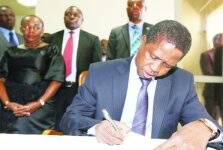The democratic dealings of South Africa’s final apartheid-era president get welcome but patchy attention in Nicolas Rossier’s doc.
While we surely haven’t seen the last biopic dedicated to his political foil, collaborator and Nobel co-winner Nelson Mandela, filmmakers have proven more resistant to the complex, compromised life and legacy of F.W. de Klerk, South Africa’s final pre-democracy president. For reasons of balance alone, then, Nicolas Rossier’s no-frills documentary “The Other Man: F.W. de Klerk and the End of Apartheid” is welcome: A mostly diplomatic attempt to paint a fuller portrait of the country’s most rapidly transformative political period for what one of its talking heads refers to as the “Born Free generation.” Yet it’s an opportunity only half-seized: haphazard both as biography and historical survey, the film asks more salient questions than it can answer in a rushed 76 minutes.
For those who didn’t witness the transition first-hand, it’s easy to underestimate de Klerk’s necessarily self-defeating role in bringing South Africa’s era of “separate development” — the National Party’s formal, euphemistic term for apartheid — to a close. Even the man himself appears to define his contribution more in terms of what he avoided than what he achieved. “What I did prevented a catastrophe,” he says of his relatively brief but radically productive presidency between 1989 and 1994, a time which found him attempting to convince and corral skeptical factions on both sides of the divide in a period when politically motivated violence was at a dangerous national high.
For many of his own supporters and party members, de Klerk’s call for the African Nation Congress to be unbanned (and, of course, for Mandela to be released from prison) amounted to a betrayal, accepting and hastening the inevitability of black rule. For his opponents, however, such liberal gestures were neutralized by his lack of assertion in other areas — notably, the blind eye seemingly turned to atrocities committed by police counterinsurgency unit C1, essentially a death squad targeting National Party opponents. The debate over de Klerk’s degree of complicity in their actions remains unresolved, and is the principal factor clouding his reputation as other architects of democracy settle in the historical ledger. Now 78 — and a willing, articulate interviewee throughout — de Klerk remains adamant that he was uninformed of any government-sanctioned killings under his leadership, while voices from the left and right alike (including imprisoned C1 chief Eugene de Kock) dismiss these claims as disingenuous.
Rossier’s film is commendably even-handed on this matter without being especially illuminating. Ranging from Mandela’s successor Thabo Mbeki to former South African Supreme Court Judge Richard Goldstone, his interviewees are authoritative and well-chosen, but permitted to speak in broad generalities, with few intimate or anecdotal insights to color their perspective either way.
That Rossier clearly set out to examine de Klerk’s political life rather than his personal one — there’s no mention whatsoever of his headline-making, adultery-prompted 1998 divorce from wife Marike — speaks to his and his film’s integrity and good taste, but there are points where it’s counter-productive to separate the two. His ideological disagreements with his older brother Willem (the only information to emerge of de Klerk’s early life and upbringing) are referred to in passing, but not the fact that Willem was a founding member of the leftist Democratic Party, which overtook the National Party as the ANC’s official opposition in 1999. “The Other Man” is disappointingly short on such contextualizing details, while its historical overview is patchy and oddly apportioned: Much screen time is spent on a rather elementary tutorial on the apartheid administration, yet South Africa’s history-making 1994 democratic election — the endgame that de Klerk’s presidency dutifully but dolefully engineered — is inexplicably skipped in its entirety.
In terms of its assembly, the pic is proficient but strictly televisual, with archive material that showcases critical political players but provides little in the way of local color or street-level feeling. A native filmmaker would surely have included at least one shot of a once-ubiquitous suburban feature that remains the most persistent physical reminder of de Klerk’s reign: the universal road sign, graffiti-modified by panicked nationalists, imploring onlookers to “STOP F.W.”
Source






